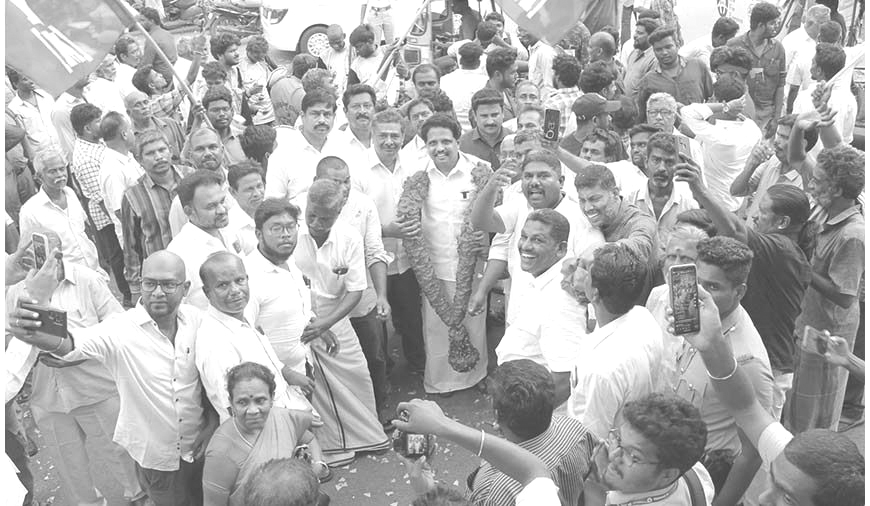
V B Ganesan
AS part of its political strategy, the BJP has consistently tried to establish a presence in Tamil Nadu through various methods. However, unlike other states in southern India, the people of Tamil Nadu and Puducherry have once again made it abundantly clear that they do not welcome the saffron party on their soil, regardless of the tactics used or promises made. They have overwhelmingly voted for the DMK-led INDIA alliance, which achieved a resounding victory by winning all 39 seats in Tamil Nadu and the one seat in Puducherry.
The pollsters suggested that the BJP might make some gains in the state due to the energetic campaign led by their state president, Annamalai, in recent times. He actively sought media attention through various means. Additionally, prime minister Modi conducted seven road shows across the state, aiming to influence the people with numerous promises.
In the Lok Sabha election, various political party alliances participated. These alliances included the INDIA alliance, the AIADMK alliance, the BJP-PMK alliance, and Naam Thamizhar Katchi (NTK). Within the INDIA alliance, the DMK contested in 22 seats, with the Kongu party contesting under the DMK's rising sun symbol. The Congress contested in 10 seats, the CPI(M) in 2 seats, the CPI in 2 seats, the VCK in 2 seats, the MDMK in one seat, and the IUML in one seat. All of these parties emerged as winners in this election.
The CPI(M) contested in Madurai and Dindigul, receiving 430,323 votes in Madurai and winning the seat by a margin of 209,411 votes. In Dindigul, the party received 670,149 votes and won the seat by a margin of 443,821 votes.
The AIADMK alliance was formed for the Lok Sabha elections, comprising the AIADMK, DMDK, Puthiya Thamizhagam (PT), and STPI. The AIADMK contested in 34 seats, with PT and STPI using the AIADMK's Two Leaves symbol, while the DMDK contested in 5 seats.
Under the BJP alliance, the BJP fielded candidates in 23 seats, which included prominent figures such as IJK, Devanathan, A C Shanmugam, and John Pandian. These candidates ran under the BJP symbol in this election. Additionally, the PMK contested in 10 seats, the TMC in 3 seats, the AMMK in 2 seats, and the OPS in one seat.
The Tamil nationalist outfit Naam Thamizhar Katchi (NTK) contested all 39 seats independently, focusing on criticising DMK policies to attract anti-DMK voters and the youth. In this election, NTK's vote share increased from 3.89 per cent in 2019 to 8.10 per cent, earning it the status of a state party due to substantial support from young voters.
The BJP has been preparing for the Lok Sabha election for the past two years or more. During this time, all India leaders and union ministers (including prime minister Modi) have made frequent visits to Tamil Nadu. The padayatra of Annamalai in Tamil Nadu has also received significant news coverage from newspapers and other media outlets. Additionally, the BJP has made serious efforts to form alliances with different caste formations by mobilising leaders from various caste outfits. They utilised the office of the governor and the judiciary whenever necessary to achieve their goals. Money has not been an issue for the BJP, as social media, other media platforms, and newspapers provided extensive coverage for their campaign. However, out of the 19 seats the BJP contested, they have lost their deposit in 10 seats. Overall, the alliance has lost their deposit in a total of 21 seats. Furthermore, the BJP's alliance partner, PMK, has lost its state party recognition as a result of this election.
In the 2019 Lok Sabha election, the AIADMK managed to secure only one seat. However, this time around, they were unable to win any seats at all. As the main opposition party in the state, the AIADMK found themselves in third place in 11 seats and fourth place in 3 seats. Adding to this disappointing result, the AIADMK also lost their deposit in 8 seats.
Despite prime minister Modi occasionally making statements in Tamil, and the controversial attempts by the governor to raise issues against the traditional politics of Tamil Nadu, as well as the BJP's efforts to attract various caste groups in the state, the people of Tamil Nadu have emphatically rejected the BJP once again.
During his campaign, DMK president and chief minister M K Stalin strongly emphasized his intention to expose the BJP. In his meetings, he highlighted issues such as communal and hate politics, the denial of democratic rights, the arrest of opposition leaders through the use of central agencies, and the politics of retribution. He also presented the achievements of the Dravidian model rule. Furthermore, he pointed out the denial of states' rights and the lack of federal cooperation by the centre throughout the BJP's ten-year rule.
After the announcement of these results, K Balakrishnan, state secretary of the CPI(M), expressed his sincere appreciation to the people of Tamil Nadu. He emphasized that the outcome once again confirms that communal sentiments, money power, bureaucratic manipulation, and electoral rule violations will not mislead the people. And he confidently declared that no matter how frequently prime minister Modi visits the state, the BJP will never be able to gain presence here.


